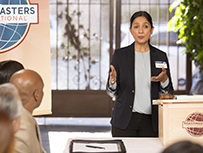
I’ve seen some great—and not so great—Table Topics sessions. Why do some stand out and others fall flat?
I brainstormed possible answers with Canadian Toastmaster Carolyn Kaldy, DTM, just before she won a division-level Table Topics Contest earlier this year. Her tips reinforced my goal whenever I serve as Topicsmaster: to ask the type of questions members want to answer. “The Topicsmaster role is about giving them a chance for success,” Kaldy says.
With that in mind, try these tips next time you’re the Topicsmaster.
Look for inspiration
- Adopt a meeting theme. Whether it’s movies or motivation or buying your first car, having a theme offers all sorts of possibilities for questions.
- Play with holidays. In addition to established special days, check for unusual or wacky holidays. Kaldy’s club recently chose the meeting theme of National Animal Cracker Day, and the Topicsmaster used it as a springboard for questions like “What’s your favorite animal and why? What kind of animal are you like?”
- Check the Toastmasters guide to “Selecting Your Topic” from the Better Speaker Series. This is a resource to help develop speeches, but Topicsmasters can draw on the same principles, says Kaldy.
Formulating questions
“The questions shouldn’t be too abstract, convoluted or likely to stump people,” advises Kaldy, a member of both the CanOrators and Pursuers clubs in Calgary, Alberta, Canada. Save the easiest questions for a guest or a less confident member, she suggests; set aside the more demanding ones for members who like a challenge.
The questions should allow speakers to offer opinions or stories from their own experience.
- The most effective questions are open-ended, meaning they can’t just be answered with a “yes” or “no.” If you must ask a closed question, add “why” at the end.
- Questions shouldn’t ask for specialized knowledge, like “How do airplanes fly?” Rather, something like “What was the best airplane ride you’ve ever taken?”
- Be sensitive to people’s circumstances. “This is when it helps to know your club,” says Kaldy. “You wouldn’t want to ask a question about losing a job if someone just got laid off.”
- Keep it general.
• Too specific: What did Fred Rogers of “Mister Rogers Neighborhood” contribute to children’s TV? (Some members may not have seen that show.)
• Better: What constitutes good children’s television? (Most everyone has seen some children’s programs.)
Picking speakers
When it comes to picking speakers, Kaldy suggests members look at the agenda and choose those who have no role in the meeting or a small role. However, don’t overlook experienced Toastmasters who may not get called on as often because they take on more demanding roles at meetings.
Let guests know before the meeting that if you call on them for Table Topics, it’s fine to decline the invitation if they’re not ready to participate just yet. You don’t want to put anyone on the spot. Call on one or two guests, but not to the exclusion of club members.
Finally, in the lead-up to a Table Topics contest, make sure club representatives in the contest get a chance to practice.
Presenting the question
State the question—then call on someone. That way, Kaldy says, everyone in the room listens carefully, thinks about how they would answer and gets that little jolt of adrenaline wondering if they are next. If you ask for volunteers, people who are shy may be reluctant to respond. And those who jump at the chance often need the least practice.
Be professional and positive. Avoid asking members if they’d like to answer the question. If they refuse, they’ve lost an opportunity to improve. Instead, welcome them warmly and enthusiastically to participate: “Frank, please come up and take the stage.”
Stand at center stage when you ask the question, then move to the side or sit nearby. When the speaker is done, start the applause and return to the center. After each speaker, make brief comments related to the speech such as, “Wow, it sounds like a car trip with you would be a lot of fun.” Then move to the next topic: “Continuing with our theme …”
Go for it!
Signing up to be Topicsmaster is a win-win for you and the club. The role is fun and creative and allows you to apply all your Toastmasters skills. More important, it’s your chance to boost your club members’ confidence and help them realize they can do this.
If you lack confidence when asked to speak on the spot, watch the video below and learn valuable tips for the next time you're asked to speak off the cuff.
Watch Toastmaster Carolyn Kaldy at the 2017 Annual Toastmasters Convention during the Table Topics contest.
Related Articles

Table Topics
Being the Best Table Topicsmaster

Table Topics
Shake Up Table Topics With Creative Ideas

Table Topics



 Previous
Previous
 Previous Article
Previous Article